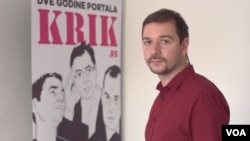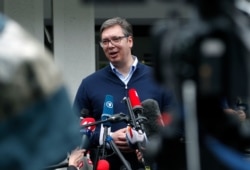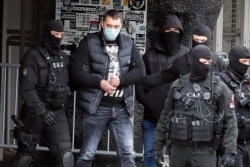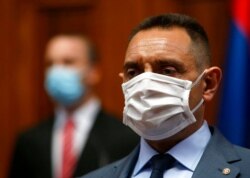The suspected head of a crime network accused of drug trafficking and murder has implicated high-ranking officials, including Serbian President Aleksandar Vucic, in corruption allegations.
For journalists from the Crime and Corruption Reporting Network (KRIK) and Newsmax Adria, the allegations, which arose during police questioning, confirmed what they had been reporting for several months.
Both independent media outlets obtained and published extracts from the statements that Veljko Belivuk, the alleged head of a criminal organization, and co-conspirator Marko Miljkovic are said to have given to police. The men were arrested in February.
But far from welcoming the investigative reporting, close allies and supporters of Serbia's ruling party and the pro-government tabloid press have attempted to discredit the media outlets, including accusing the journalists of cooperating with organized crime to try to overturn the government.
In his statement to police, Belivuk claimed he was connected to Vucic, Minister of Internal Affairs Aleksandar Vulin, and other officials in the ruling Serbian Progressive Party (SNS).
Belivuk told investigators that officials wanted his criminal network to do favors, including acting as security at a Pride parade, intimidating organizers of anti-government protests and ensuring that supporters of FK Partizan — one of the two major Serbian soccer clubs — didn't chant offensive slogans against the president, KRIK reported.
Vucic and Vulin have denied the allegations and said they are fighting organized crime. The president also denied meeting or communicating with Belivuk or members of his criminal organization.
"If proven that I was seeing them, I will resign, go to jail, and pay my accommodation while I am in prison," Vucic said at a press conference.
Corruption beat
KRIK investigative reporter Milica Vojinovic told VOA that Belivuk's statement matched what the media outlet had been reporting.
"There are many coincidences of which we were already aware: that the government had control over the groups cheering at soccer, and that it was done through Belivuk's group. We witnessed that Pride parades in Belgrade were more peaceful after the (SNS) came to power," Vojinovic said. "And now we have Belivuk, who is saying that one of the services he allegedly provided for the government was to stop hooligans breaking up the Pride parade and causing problems."
Vulin said the allegations and reporting on the police statements were part of a campaign to try to influence politics and elections.
Members of the ruling party and some pro-government tabloid papers have also mocked and smeared independent media that reported on the allegations. Many claimed the media were directly linked to organized crime.
Several pro-government tabloids ran front pages in late July, falsely linking KRIK to Belivuk's gang.
The Informer tabloid accused KRIK of having "fired the first bullet" at Vucic, suggesting that reporting the gang's claims had jeopardized the president's safety. Another pro-government tabloid, Objektiv, claimed KRIK was linked to the mafia.
KRIK editor Stevan Dojcinovic responded to the smear campaign, telling VOA broadcast affiliate N1 that its article was written carefully, and emphasizing that while Belivuk could not be completely trusted, his allegations coincided with known events and incidents.
"They called me and KRIK many names, but I have never seen such sick and brutal statements, which show that they are in great fear," Dojcinovic told N1.
European Commission spokesperson Ana Pisonero Hernandez told VOA that journalists should be free to work without "harassment and intimidation, to ensure that citizens have access to all information."
Pisonero Hernandez said that the fight against organized crime is a priority for Serbia and a necessary condition for any country wanting to join the EU.
The EU supports Serbia's work in tackling crime and has called on the country to strengthen its record in prosecuting those involved in high-level corruption, Pisonero Hernandez said, adding, "This is important to demonstrate the effectiveness of rule of law reforms in practice."
Attempts to discredit KRIK are not new. The Belgrade-based nonprofit outlet, which is part of the Organized Crime and Corruption Reporting Project (OCCRP), faced a similar campaign of harassment in March when pro-government media falsely linked KRIK to Belivuk after his arrest. Its journalists have also reported their homes being broken into, with belongings searched but nothing taken.
The harassment appears to show that authorities do not tolerate independent reporting, according to Gulnoza Said, head of the Europe and Central Asia program at the New York-based Committee to Protect Journalists.
"By mocking KRIK journalists and otherwise harassing them, the officials are putting these journalists at greater risk," Said told VOA.
"KRIK has been doing a great service to the Serbian public by reporting on alleged corruption and organized crime. Its work is indispensable and should be cherished and valued. But what we have seen for a long time is that the authorities try to find ways to hinder KRIK's work and silence its journalists," she added.
Media watchdog Reporters Without Borders (RSF) also condemned the attempts to smear the investigative journalism of KRIK by linking the outlet to organized crime.
"It voluntarily confuses victims with criminals, given that it's KRIK reporters who were threatened by organized crime in the past. Unfortunately, this is an extremely worrying déjà vu," said Pavol Szalai, head of RSF's European Union and Balkans desk.
Szalai told VOA that a campaign earlier this year, in which members of the ruling majority made claims against the news outlet, stopped when the president stepped in, but by then, it had already gone too far.
"Now, it seems that it was only put on hold. Politicians are not doing their job in protecting journalists," Szalai said.
Serbia in recent years has declined in press freedom rankings by international watchdogs. The annual Freedom in the World report by Freedom House lists Serbia as only "partly free," and RSF ranks the country 93 out of 180 countries, where one is "most free."
This story originated in VOA's Serbian service.








